In Review: 'The Long Walk,' 'Spinal Tap II: The End Continues'
A Stephen King adaptation never takes the off-ramp from dystopia and Spinal Tap reunites well past its satirical prime.
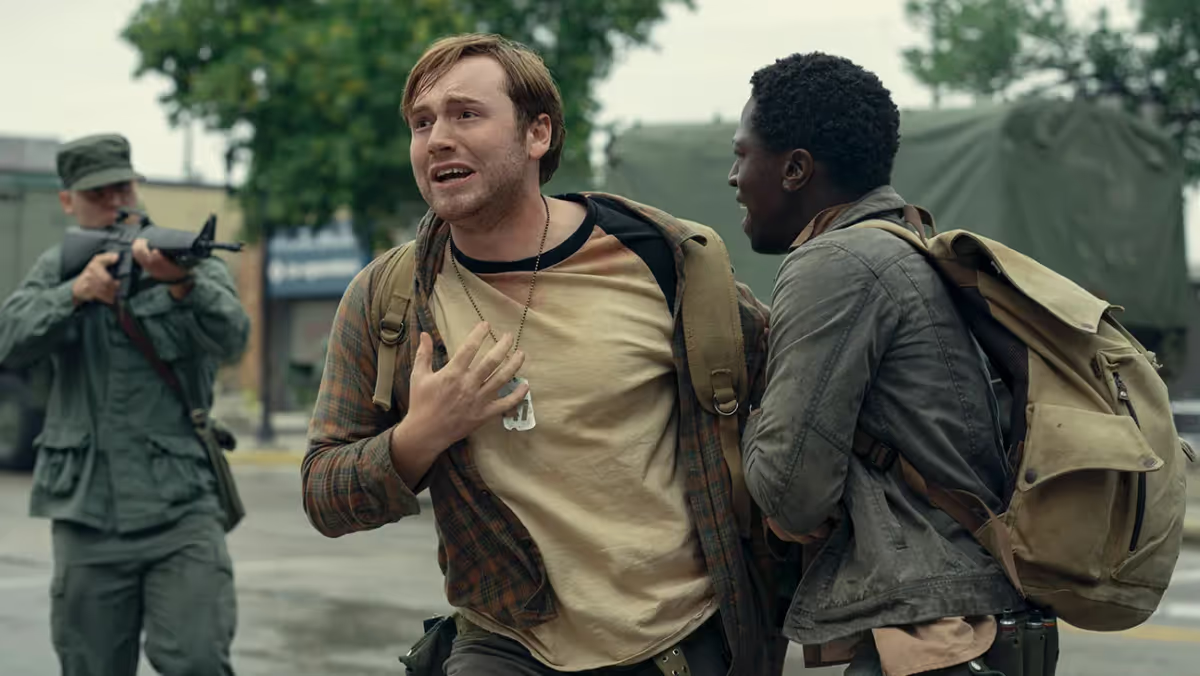
The Long Walk
Dir. Francis Lawrence
108 min.
The idea of an authoritarian government turning its own cruelty and failure into a made-for-TV is a popular premise in dystopian books and movies, and for Stephen King, the 1979 novel The Long Walk (written under his Richard Bachman pseudonym) seems, in retrospect, like a blueprint for The Running Man a few years later. Even the director of this mostly gripping adaptation, Francis Lawrence, went on a dry run of his own with The Hunger Games sequels, a franchise he took over from Gary Ross after the first film. Yet one crucial difference between The Long Walk and those other stories is that the TV aspect is stripped-down and unobtrusive, less a bread-and-circuses entertainment than a production as minimalist as the event itself. The idea of a filmed death march isn’t about distracting an imagined audience from their daily miseries, but to reinforce their hopelessness. It’s all stick, no carrot.
The Reveal is a reader-supported newsletter dedicated to bringing you great essays, reviews and conversation about movies. If you are not paid subscriber, we would love for you to click this button below and join our community.
There’s integrity to the no-frills human horror of The Long Walk and Lawrence, working from a script by JT Mollner (Strange Darling), follows through on its uncompromising bleakness. There are no Katniss Everdeen types fomenting revolution from within a customized arena of death, merely 50 young men shuffling along a road for many miles and days until their minds or bodies finally give out. Even the lookie-loos they pass in the countryside and in small towns are limited in number and desultory in appearance, wordlessly acknowledging a parade that seems to reflect a larger economic and spiritual depression. The man in charge of the event, a snarling military man referred to simply as The Major (Mark Hamill), praises his contestants as an inspiration to the public, but not even he seems convinced by his own propaganda.
Though the vast majority of the action takes place between the white lines, The Long Walk takes time to introduce its hero, Ray Garraty (Cooper Hoffman), as his mother (Judy Greer) drives him reluctantly to the starting pen. Unlike The Hunger Games, where eligible teenagers are plucked involuntarily from a lottery, contestants for “The Long Walk” apply for the opportunity for the chance to win the riches that will lift them from poverty. While Ray and the other boys have ulterior motives that will be revealed in time, they are focused on the task at hand, which is to walk at three miles per hour nonstop. If they fail to keep pace, they’re each given three warnings until soldiers flanking them in tanks and other military vehicles shoot them in the head. Other violations, like stepping outside the lines, result in immediate termination.
With all this time allotted to the slow grind of the walk itself, Lawrence and Mollner have plenty of space to develop the interpersonal dynamics between the contestants, who mostly share a camaraderie despite being pitted against each other. A half-dozen or so boys are fully realized, but the relationships spin out from the central bond between Ray and Peter McVries (David Jonsson), a gregarious Black contestant whose perspective recalls the prison yard friendship forged between Tim Robbins and Morgan Freeman in another King adaptation, The Shawshank Redemption. The main difference here is that Lawrence and Mollner don’t indulge in the same wish fulfillment fantasy: Whatever philosophy might help Ray and Peter survive this ordeal doesn’t mean they will literally survive it. There’s no cheating the rules of this game.
If anything, The Long Walk revels too much in its own brutality. The fitful elimination of competitors along the way may be an inevitable trauma, but Lawrence makes certain that we see as many gruesome headshots as possible, leaving nothing to the imagination. Yet the miseries are in keeping with a story where enlightenment is possible but escape is not. The Long Walk has an impressively sober understanding of what rebellion looks like in a nation that’s fully smothered by an oppressive regime. Hope is hard to come by. A movement is even harder to inspire. The best thing you can do is stay determined and put one foot in front of the other. — Scott Tobias
The Long Walk invites you to trudge along through these bleak times tonight.

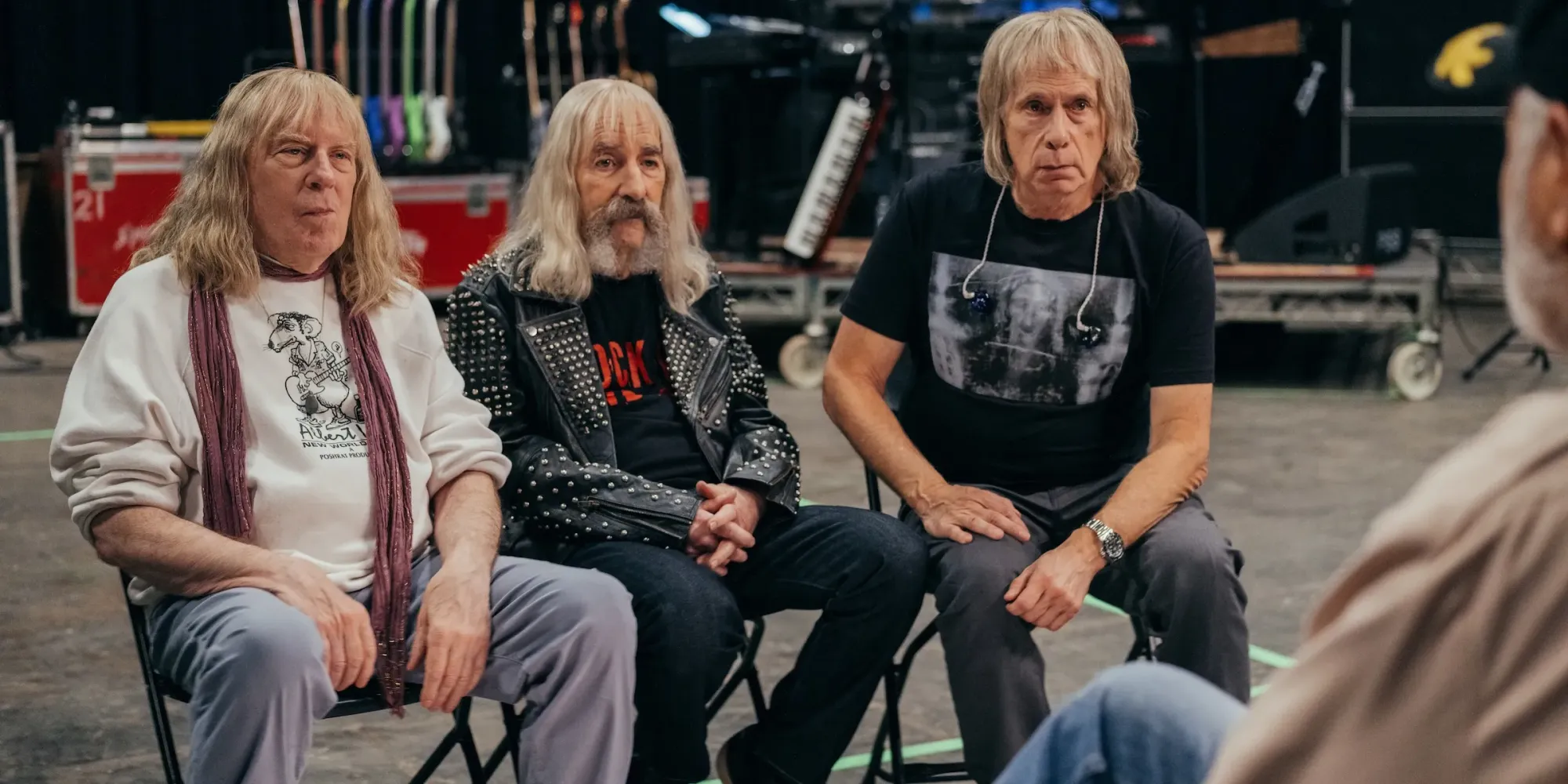
Spinal Tap II: The End Continues
Dir. Rob Reiner
83 min.
None of the most important people involved in Spinal Tap II: The End Continues, a 40-year anniver-sequel to the mockumentary classic This is Spinal Tap, have entered the project at the top of their games. Director Rob Reiner, once reliable in a prime that brought hits like The Princess Bride, When Harry Met Sally… and Misery, has been on a losing streak that’s alternated between family fare (Flipped, The Magic of Belle Isle) and clunky political dramas (LBJ, Shock and Awe). Meanwhile, Christopher Guest would sometimes include his Spinal Tap bandmates, Michael McKean and Harry Shearer, in his improvised comedies, most notably the sweet folk parody A Mighty Wind, but his troupe ran aground in the execrable 2016 comedy Mascots and hasn’t resurfaced since.
None of this is preventing Reiner and the gang from recapturing the old magic in Spinal Tap II, of course, and there are times when they fall into a pleasing rhythm that echoes, however faintly, the chemistry of the original film. Such is the common trajectory of a real-life rock band: Many artists have their prime era and fall off steadily in the years to follow, to where a fan might have to talk themselves into believing that a late-period album has some good tracks on it. The problem cuts slightly deeper for Spinal Tap II, however, because the filmmakers have lost the plot conceptually, too. The 1984 film, razzing the behind-the-scenes pretensions and rock-star clichés found in other music documentaries, works so beautifully because it’s grounded in the lived reality of a struggling metal band. The Spinal Tap of 2025 is recognized as a pop-culture phenomenon, admired by icons like Paul McCartney and Elton John, and that’s a much less common and much less funny proposition.
As Reiner’s Marty DiBergi checks back in with Spinal Tap, the band has been on a long hiatus, with Nigel Tufnel (Guest) and David St. Hubbins (McKean) once again having casually abandoned their friendship and the bassist, Derek Smalls (Shearer), drifting off as a result. DiBergi finds all of them settled into amusing entrepreneurial ventures, with Nigel running a cheese-and-guitar shop, David recording bed tracks for true-crime podcasts and hold music, and Derek overseeing a glue museum. But an obscure stipulation in their contract, now run by their former manager’s daughter (Kerry Godliman), requires them to get together for a reunion show. They book an arena in New Orleans, we’re told, due to the cancellation of an event called “An Evening with Stormy Daniels.” (Please, Rob Reiner, I’m begging you, log off social media!)
The best scenes in Spinal Tap II are either solid improvisational sessions between the three leads as the band tries to recover its long chemistry or sidebars with Nigel, who explains new this-goes-to-11-style innovations to DiBergi, like the miniature cheese board he’s folded into his guitar or the array of nonsensical guitar pedals that he can access during a show. Yet the film never quite hits the fat satirical target of modern nostalgia tours that are commonly conducted by late-middle-aged bandmates who have no creative juice and can barely stand each other. Instead, Reiner and company indulge in a victory lap that feels weirdly like an extended promotion for Tap-related merchandise, with McCartney and John doing their part to bolster the sales pitch. This is Spinal Tap was about a sub-par outfit nearing the end of the line, solvent mainly through inertia and being “big in Japan.” That’s funny. Spinal Tap II brings John into a packed arena to guest on “Stonehenge.” Where’s the joke in that? — Scott Tobias
Spinal Tap II: The End Continues opens in theaters (and on IMAX) tonight.


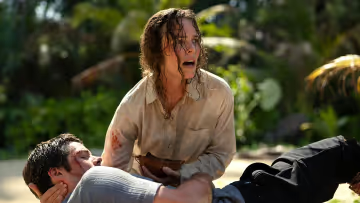
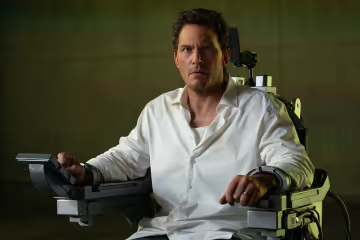
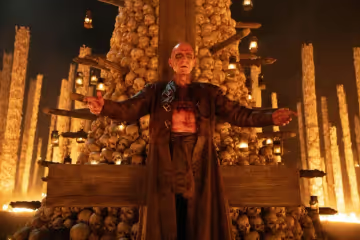
Discussion